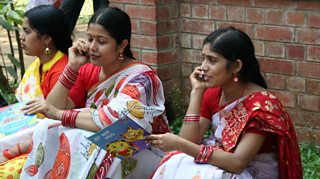mLearning: Offering accessible learning for all
Tanya Cotter
English Language Teaching editor, Βι¶ΉΤΌΕΔ Media Action in Bangladesh
Tagged with:

The multimedia learning project Βι¶ΉΤΌΕΔ Janala aims to raise the English language skills of 25 million Bangladeshis by 2017.
Since its launch in 2009, has attracted over six million users in Bangladesh and received several international awards for its innovative mix of pre-recorded English lessons and quizzes delivered through mobile phones.
International conferences provide an opportunity to share our experiences of working on a large-scale mLearning project. And last week, as Βι¶ΉΤΌΕΔ Media Action’s English Language Teaching editor in Bangladesh, I attended such an event, the .
Participants from over 50 countries gathered for an exciting week of presentations, debate and discussion on the important role mobile technology can and is playing in education.
As part of an Open University UK workshop called 'mLearning Solutions for International Development: Rethinking What’s Possible', we presented the factors which have contributed to the success of Βι¶ΉΤΌΕΔ Janala – and some of the challenges we face too.
One important challenge is how we ensure the sustainability of the service. We focused on how it will be necessary to develop partnerships which will enable us to pass the service, once funding ends, to a commercial entity, whilst retaining a focus on the broadest target audience possible.
Sustainability was an issue that also marked the informative keynote speech of the conference, given by Rita Vanska from Nokia Corporate Relations & Responsibility.
She talked about Nokia's projects in developing countries and demonstrated how Nokia MoMaths in South Africa works and the impact it’s having inside and outside the classroom.
Rita stressed how the delivery of educational content through mobile phones offers accessible learning opportunities for all. However, in order for these projects to become sustainable, she emphasised the need for further involvement and engagement of governments, telecom providers and other partners.
In addition to the issue of sustainability, another challenge is measuring large-scale impact which, like any new educational initiative, requires time, money and resources. Without a substantial body of evidence of the educational impact of mobile technologies on teachers and learners, it is more difficult to persuade stakeholders to invest in and adopt them.
Although this evidence is emerging, it seems to me that further investment in measuring impact is required. In 2013, Βι¶ΉΤΌΕΔ Media Action will be carrying out a large-scale research study to evaluate improvements in English language competency of users of the Βι¶ΉΤΌΕΔ Janala mobile phone service. This study will be able to contribute to a global body of evidence around the educational impact of mLearning.
Having worked on the Βι¶ΉΤΌΕΔ Janala mobile service project since August 2010, I’m already aware of how mLearning can help make a difference in people’s lives.
I'll never forget one of our users, Mohammend Sultan, who told us that anyone – no matter what their literacy level – can learn English and gain the confidence he has developed while using Βι¶ΉΤΌΕΔ Janala. As he says, "They could be a housewife, a housekeeper, a father, a boss or a guard. Anybody can do it." We made a short film about how his new skills have helped him in his job. Measuring and sustaining this impact on a large-scale is the next step in truly transforming where, when and how people learn.
Related links
Elsewhere on Βι¶ΉΤΌΕΔ Media Action:
